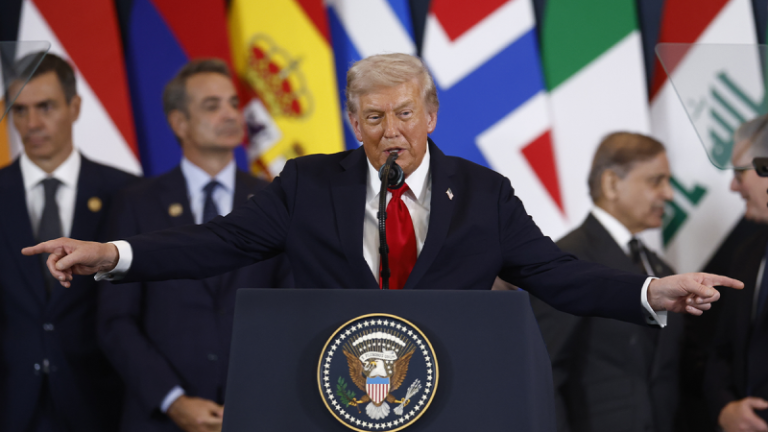Tomahawks, Tomahawks, Tomahawks. That’s the word buzzing in the ears of Russian President Vladimir Putin, as President Donald Trump weighs providing America’s precision strike missile of choice to Ukraine.
Since May, Trump has bombed the Houthis in Yemen, obliterated Iran’s nuclear facilities and hit narco-terrorist drug boats in the Caribbean. Putin has to realize that Tomahawks could soon be in the skies over Russia.
What can Ukraine hit with the 1000-mile range Tomahawks? Start with the Shahed drone factory in Tatarstan, and at least 67 Russian airbases. Tomahawks in Ukraine’s hands rip open Russian energy infrastructure to precision attack with no warning.
If Ukraine launches Tomahawks, they’ll be flying as low as 100 feet, hugging the terrain, evading radar. TLAMs can each take separate routes at 500 mph then meet up over the Russian target for a coordinated strike.
Trump is baiting Putin. ‘Hopefully, they won’t need it,’ Trump said of the Tomahawks at Friday’s lunch with Ukrainian President Volodymyr Zelenskyy at the White House. Trump said he’d like to ‘get the war over without Tomahawks’ but then went on to describe the missiles as ‘very dangerous’ and ‘incredible.’
Here’s the backstory on the Tomahawks, and why Trump is keeping them on the table to pressure Putin.
Built for the Russian target set
First tested in 1972, the Tomahawk Land Attack Cruise Missile or TLAM was actually developed by the U.S. Navy during the Cold War to attack targets on land in the Soviet Union. In case you haven’t seen one up close, the Tomahawk is 20 feet long but just 21 inches wide. It looks like a white pole with wiglets, but inside is a powerful turbo-fan engine and sophisticated guidance. Today’s Block IV Tomahawks can be retargeted in flight, and loiter over a target for hours, taking electro-optical scans and waiting for other missiles to arrive before detonating. They carry a unitary warhead for harder targets, or dispense cluster munitions over a wide pattern to hit airfields, for example. (Yes, there was once a nuclear TLAM variant with a 200 Kiloton warhead, but they were placed in storage in 1991 and eliminated in 2010.)
Air Defense Nightmare
The presence of Tomahawks in Ukraine will set up an almost insoluble air defense problem for Putin. No way can Russia place air defenses at every remote gas pipeline point or cover all the airbases where planes park out in the open.
Fast delivery
TLAMs could be in Ukraine in 24 hours. The Army Mid-Range Capability missile system is a tractor-trailer missile launcher that can be driven onto a U.S. Air Force C-17 cargo plane. The Army deployed TLAM launcher 8,000 miles away to North Luzon in the Philippines in under 15 hours last year for a wargame. Trump has plenty of time.
Deterring Putin. The brutal escalation of mass attacks by Russia led Ukraine to ramp up its drone strikes on Russian energy starting in August. According to a Reuters study, Ukraine’s drones have hit 18 pumping stations, plus 32 strikes on refineries. Ukraine’s Liutyi drones have a range of about 600 miles and carry warheads of about 50 pounds. Mixing in TLAMs would intensify pressure on Russian energy, Putin’s single biggest source of government revenue. Zelenskyy has called Ukraine’s drone attacks on Russian energy ‘the sanctions that work the fastest.’
Don’t worry about depleting TLAM inventory
The U.S. still has about 4,000 Tomahawks in its inventory, and new missiles like the U.S. Navy’s SM-6 are already in action. The U.S. Army deployed its new Dark Eagle long-range hypersonic weapons to Australia in August and will have its first full battery by December. By the way, last year Japan bought 400 Tomahawks for targeting China and North Korea.
Combat Record
Tomahawks have piled up an incredible combat record since Jan. 17, 1991, when 122 TLAMs hit Iraqi oil and command and control targets at the start of Operation Desert Storm. Eight-hundred TLAMs were fired in Operation Iraqi Freedom in 2003. Over the years, Tomahawks have hit targets in Iraq, Serbia, Afghanistan, Libya, Syria, Yemen and, of course, Iran. On June 22, TLAMs hit above-ground ‘key surface infrastructure targets’ in the nuclear complex at Isfhahan, according to Chairman of the Joint Chiefs of Staff Gen. Dan Caine. The TLAM strikes left the sprawling site visibly damaged and blackened. ‘We gave it a capper with 30 TLAMS,’ as Trump said Friday.
Putin may yell and scream about Tomahawks for Ukraine. Pay no attention. He’s grumbled about each weapon system, from F-16s to Patriots. And no, Putin does not dare escalate with nuclear weapons in Ukraine, because the wind patterns blow radiation clouds back into Russia.
As Trump said Friday: ‘Yeah, its escalation. But we’re going to talk about it anyway.’
This post appeared first on FOX NEWS










